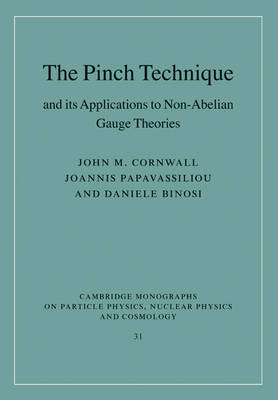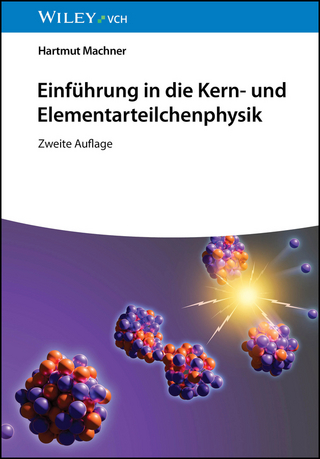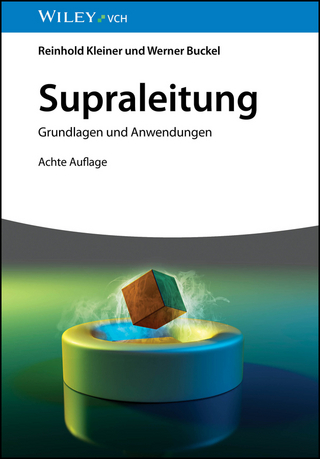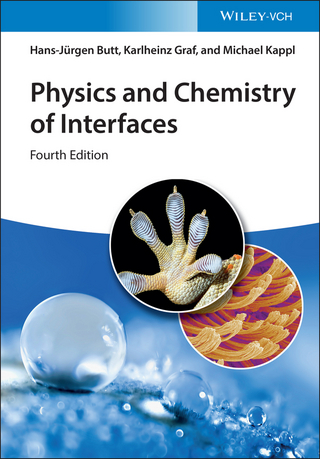
The Pinch Technique and its Applications to Non-Abelian Gauge Theories
Cambridge University Press (Verlag)
978-0-521-43752-3 (ISBN)
Non-Abelian gauge theories, such as quantum chromodynamics (QCD) or electroweak theory, are best studied with the aid of Green's functions that are gauge-invariant off-shell, but unlike for the photon in quantum electrodynamics, conventional graphical constructions fail. The Pinch Technique provides a systematic framework for constructing such Green's functions, and has many useful applications. Beginning with elementary one-loop examples, this book goes on to extend the method to all orders, showing that the Pinch Technique is equivalent to calculations in the background field Feynman gauge. The Pinch Technique Schwinger-Dyson equations are derived, and used to show how a dynamical gluon mass arises in QCD. Applications are given to the center vortex picture of confinement, the gauge-invariant treatment of resonant amplitudes, the definition of non-Abelian effective charges, high-temperature effects, and even supersymmetry. This book is ideal for elementary particle theorists and graduate students.
John M. Cornwall's main research interest is non-perturbative quantum chromodynamics, both in four dimensions and in three (with applications to the functional Schrödinger equation and to high temperatures). Many of these results depend heavily on the pinch technique, as described in The Pinch Technique and its Applications to Non-Abelian Gauge Theories. He has also worked fairly recently on the applications of non-Abelian gauge theories to the early universe, in primordial magnetic fields and baryon asymmetry. Earlier work was in dynamical symmetry breaking, the equivalence theorem and effective potentials for gauge theories. He has also worked in space physics, including the aurora and Earth's ring current. Joannis Papavassiliou is a Researcher in the Department of Theoretical Physics and IFIC, the University of Valencia-CSIC. A large part of his work has been devoted to the development of the Pinch Technique, both its formal foundation as well as many applications, and he has published several articles on quantum field theory and particle phenomenology. Daniele Binosi is a Researcher at the European Centre for Theoretical Studies in Nuclear Physics and Related Areas (ECT) and Fondazione Bruno Kessler. In addition to his work extending the Pinch Technique and its applications, he leads several policy-related European projects developing the vision and sustainability of quantum information foundations and technologies.
Introduction; 1. The Pinch Technique at one loop; 2. Advanced pinch technique – still one loop; 3. Pinch technique to all orders; 4. The pinch technique in the Batalin-Vilkovisky framework; 5. The gauge technique; 6. Schwinger-Dyson equations in the pinch technique framework; 7. Non-perturbative gluon mass and quantum solitons; 8. Nexuses, sphalerons, and fractional topological charge; 9. A brief summary of d=3 NAGTs; 10. The pinch technique for electroweak theory; 11. Other applications of the pinch technique; Appendix; Index.
| Erscheint lt. Verlag | 23.12.2010 |
|---|---|
| Reihe/Serie | Cambridge Monographs on Particle Physics, Nuclear Physics and Cosmology |
| Zusatzinfo | 29 Halftones, black and white; 44 Line drawings, black and white |
| Verlagsort | Cambridge |
| Sprache | englisch |
| Maße | 179 x 254 mm |
| Gewicht | 730 g |
| Themenwelt | Naturwissenschaften ► Physik / Astronomie ► Atom- / Kern- / Molekularphysik |
| Naturwissenschaften ► Physik / Astronomie ► Hochenergiephysik / Teilchenphysik | |
| Naturwissenschaften ► Physik / Astronomie ► Quantenphysik | |
| ISBN-10 | 0-521-43752-0 / 0521437520 |
| ISBN-13 | 978-0-521-43752-3 / 9780521437523 |
| Zustand | Neuware |
| Haben Sie eine Frage zum Produkt? |
aus dem Bereich


